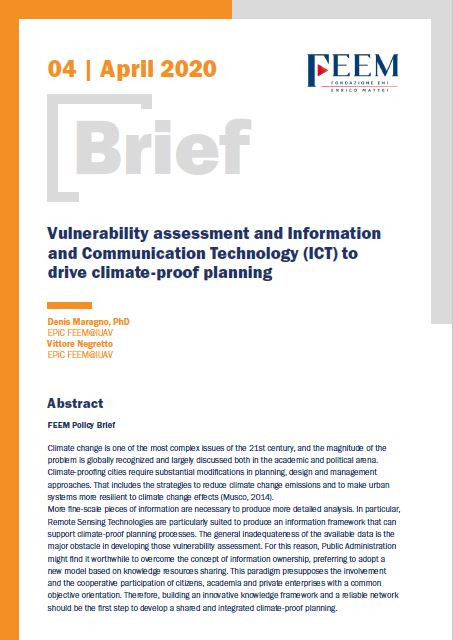Vulnerability assessment and Information and Communication Technology (ICT) to drive climate-proof planning

03.04.2020
Denis Maragno (EPiC | FEEM@IUAV); Vittore Negretto (EPiC | FEEM@IUAV)
Climate change is one of the most complex issues of the 21st century, and the magnitude of the problem is globally recognized and largely discussed both in the academic and political arena. Climate-proofing cities require substantial modifications in planning, design and management approaches. That includes the strategies to reduce climate change emissions and to make urban systems more resilient to climate change effects (Musco, 2014). More fine-scale pieces of information are necessary to produce more detailed analysis. In particular, Remote Sensing Technologies are particularly suited to produce an information framework that can support climate-proof planning processes. The general inadequateness of the available data is the major obstacle in developing those vulnerability assessment. For this reason, Public Administration might find it worthwhile to overcome the concept of information ownership, preferring to adopt a new model based on knowledge resources sharing. This paradigm presupposes the involvement and the cooperative participation of citizens, academia and private enterprises with a common objective orientation. Therefore, building an innovative knowledge framework and a reliable network should be the first step to develop a shared and integrated climate-proof planning.
Climate change is one of the most complex issues of the 21st century, and the magnitude of the problem is globally recognized and largely discussed both in the academic and political arena. Climate-proofing cities require substantial modifications in planning, design and management approaches. That includes the strategies to reduce climate change emissions and to make urban systems more resilient to climate change effects (Musco, 2014). More fine-scale pieces of information are necessary to produce more detailed analysis. In particular, Remote Sensing Technologies are particularly suited to produce an information framework that can support climate-proof planning processes. The general inadequateness of the available data is the major obstacle in developing those vulnerability assessment. For this reason, Public Administration might find it worthwhile to overcome the concept of information ownership, preferring to adopt a new model based on knowledge resources sharing. This paradigm presupposes the involvement and the cooperative participation of citizens, academia and private enterprises with a common objective orientation. Therefore, building an innovative knowledge framework and a reliable network should be the first step to develop a shared and integrated climate-proof planning.
